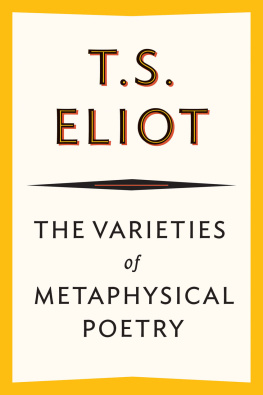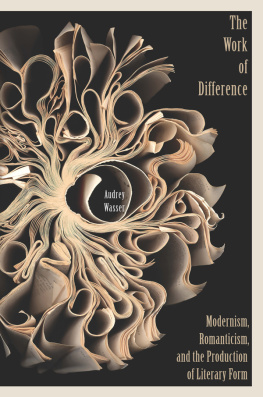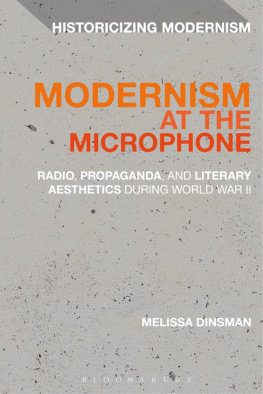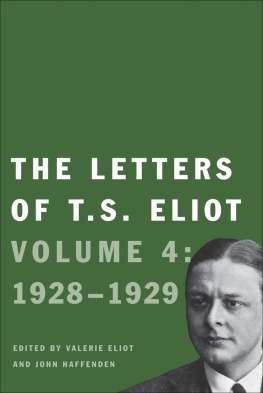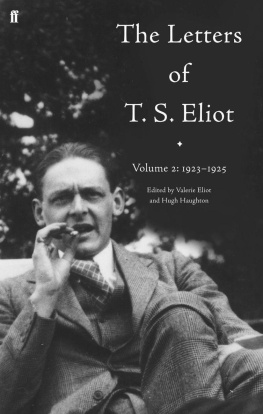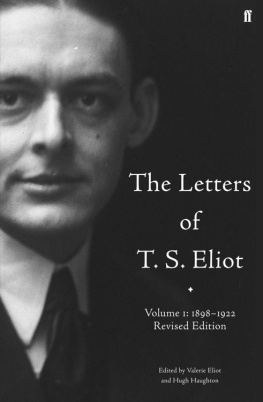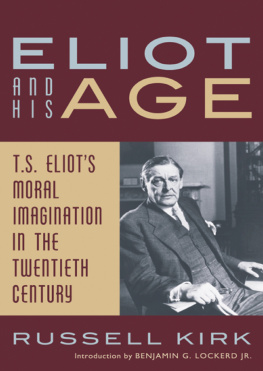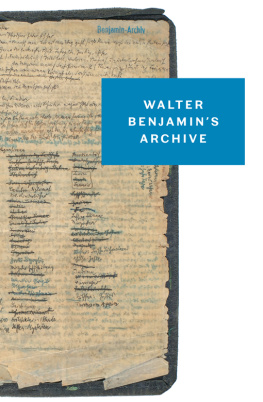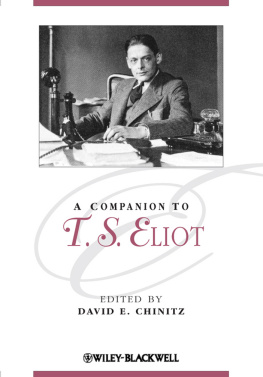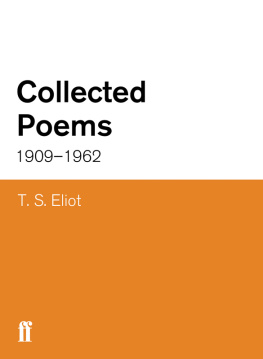IMPOSSIBLE MODERNISM
T. S. ELIOT, WALTER BENJAMIN, AND THE CRITIQUE OF HISTORICAL REASON
ROBERT S. LEHMAN
STANFORD UNIVERSITY PRESS
STANFORD, CALIFORNIA
Stanford University Press
Stanford, California
No part of this book may be reproduced or transmitted in any form or by any means, electronic or mechanical, including photocopying and recording, or in any information storage or retrieval system without the prior written permission of Stanford University Press.
Printed in the United States of America on acid-free, archival-quality paper
Library of Congress Cataloging-in-Publication Data
Names: Lehman, Robert S. (Robert Scott), author.
Title: Impossible modernism : T.S. Eliot, Walter Benjamin, and the critique of historical reason / Robert S. Lehman.
Description: Stanford, California : Stanford University Press, 2016. | Includes bibliographical references and index.
Identifiers: LCCN 2016001497 | ISBN 9780804799041 (cloth : alk. paper)
Subjects: LCSH: Eliot, T. S. (Thomas Stearns), 1888-1965Criticism and interpretation. | Benjamin, Walter, 18921940Criticism and interpretation. | Literature and history. | Modernism (Literature)
Classification: LCC PS3509.L43 Z69177 2016 | DDC 821/.912dc23
LC record available at http://lccn.loc.gov/2016001497
ISBN 9781503600140 (electronic)
Typeset by Bruce Lundquist in 10/14 Minion Pro
For Audrey
One is soon forced to resort to paradoxical formulations, such as defining the modernity of a literary period as the manner in which it discovers the impossibility of being modern.
Paul de Man, Literary History and Literary Modernity
CONTENTS
ACKNOWLEDGMENTS
The initial development of my arguments in this book benefited from the attention of my mentors at Cornell University. I want to start by thanking Jonathan Culler, Peter Gilgen, Douglas Mao, and Neil Saccamano. All wereand arevalued advisers, interlocutors, and examples of the sort of scholar that I hope someday to be.
Much of what made it into this book I learned through countless exchanges with teachers, colleagues, and friends. Any listing of names is bound to be incomplete; nonetheless, I want to thank Kevin Attell, Alexis Briley, Becky Colesworthy, Bradley Depew, Ben Glaser, John Hicks, Aaron Hodges, Jess Keiser, Tracy McNulty, Douglas McQueen-Thomson, Steven Miller, Julia Ng, Jeff Pence, Robert Ray, Robin Sowards, Danielle St. Hilaire (for Chaucer!), Phil Wegner, and Alan Young-Bryant; as well as all of the members of the Theory Reading Group and the Hegel Reading Group (in Ithaca as well as in Paris). Beyond any particular institutional context, Nathan Brown, Anna Kornbluh, Knox Peden, and Josh Robinson have been vital sources of intellectual energy. Martin Hgglund provided invaluable advice and support during the completion of this project, especially in its final stages.
I completed this book as a member of the English Department at Boston College. For the warm scholarly welcome I have received there, I owe thanks to all of my colleagues. I am especially grateful for advice I received on this project from Marjorie Howes, Suzanne Matson, Kevin Ohi, and Frances Restuccia. Across the river, the Mahindra Seminar in Dialectical Thinking at Harvard University has provided further intellectual stimulation, and for this I thank friends and co-organizers (past and present) Will Baldwin, Jamey Graham, Julie Orlemanski, Gordon Teskey, and Andrew Warren.
The final version of this manuscript has profited from the incisive comments of two anonymous reviewers, while my editors at Stanford University Press, Emily-Jane Cohen and Friederike Sundaram, have been helpful and responsive every step of the way.
My family in Ohio has always supported me. To my late grandparents John and Anne Chambers and especially to my mother Sally Chambersthank you for all that you have done and know that I love you very much. Finally, and with all of my heart, I dedicate this book to my partner, Audrey Wasser, doubtless the better craftsperson, who scrutinized every page and without whom none of this would have been possible.
An early version of Chapter 6 first appeared as Allegories of Rending: Killing Time with Walter Benjamin, in New Literary History 39.2 (Spring 2008): 233250. Copyright New Literary History, The University of Virginia, 2008; a portion of Chapter 2 appeared as Eliots Last Laugh: The Dissolution of Satire in The Waste Land, in Journal of Modern Literature 32.2 (Winter 2009): 6579. Copyright Indiana University Press, 2009; Chapter 5 includes some formulations that first appeared in Finite States: Toward a Kantian Theory of the Event, diacritics 39.1 (Spring 2009): 6174. Copyright Cornell University, 2011.
PREFACE
This book advances an interpretation of European modernism and, more specifically, of the relationship between European modernism and historical representation. I characterize this relationship as one of critique, not in the more colloquial sense of assessment but in the technical sense given to the term by Immanuel Kant and his successors, for whom critique describes an interrogation of the conditions of possible experience. My claim is that modernisms critique of history operates not (or not only) as the negation of tradition itself or as the extension of past forms through the creation of the new work of art but rather as a struggle to grasp and transform the formal conditions of historical experience, the conditions under which events come to appear as repetitions or innovations, as traditional or new. More concretely, my contention is that when modernist authors struggle with history, they struggle not only with the massacres and wars that made the last hundred years the most terrible century in Western history (Berlin, qtd. in Hobsbawm 1) but also with the way that these events and others have been made meaningful. They struggle, that is, with history itself, with the way that, through the stories it tells, history secures the past and sets limits on the present. It is with this struggle in mind that I read the formal experimentation characteristic of modernist writing. Directed at the problem of historical representation, modernist experimentation is an attempt to imagine an alternative architecture of history, one open to artistic innovation or political transformation.
My particular focus is on the critique of history as it is articulated in the writings of two roughly contemporaneous authors: T. S. Eliot (18881965) and Walter Benjamin (18921940). Despite their striking personal and political differences, Eliotthe self-proclaimed Anglo-Catholic, classicist, royalist; the individual who was, perhaps more than anyone else, responsible for the shape that the study of literature took during the last centuryand Benjaminthe Marxist rabbi, forced into intellectual, then literal, exile, and driven finally to suicideshared for a time in what was fundamentally the same project: the project of challenging an image of history regnant since the early years of the nineteenth century, one that came into being in the wake of the French Revolution and found its watchword in Leopold von Rankes exhortation to write history as it actually happened (wie es eigentlich gewesen ist; Ranke 57). Against this image of history, Eliot and Benjamin tapped into a submerged tradition of thinking about the relationship between historical representation and literary form, one that connects (via many intermediaries) Aristotles elevation of poetry over history in book 9 of the Poetics to Nietzsches subordination of history to life in the second of the Untimely Meditations. Fundamentally, they took as their starting point an understanding of history not as a collection of empirical facts but as something formed, something written; and so they turned to specifically literary devicesdevices such as lyric, satire, allegory, and mythto reimagine the shape of historical time and the possibility of historical change. This shared project developed over the course of their careers; and it culminated in their respective masterworks
Next page

